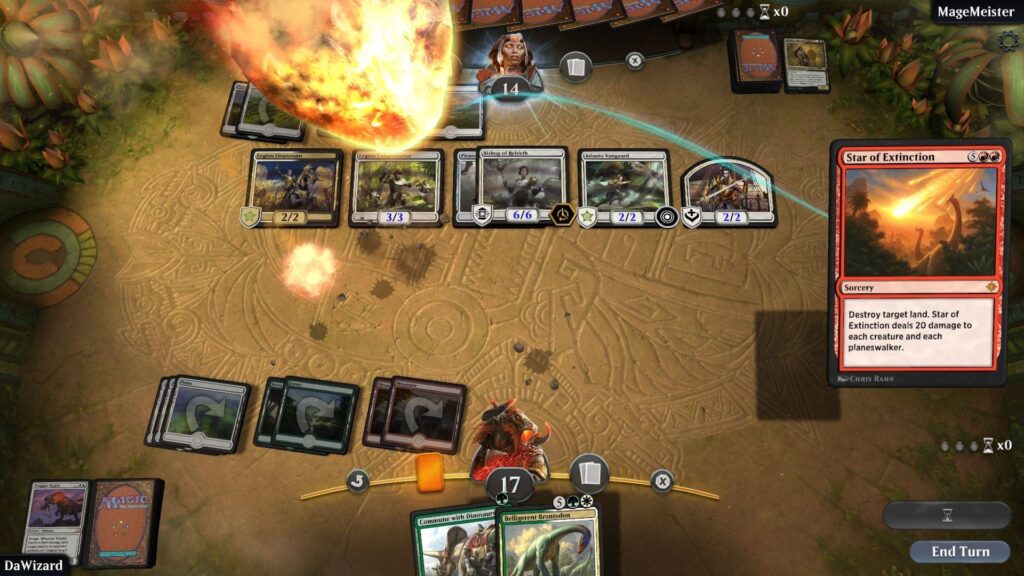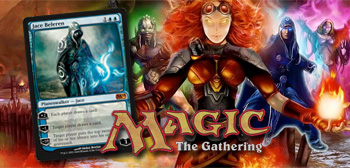Magic the Gathering Card Game
Are you fond of playing exciting card games? In this post we are sharing rules for one of the complicated but very interesting card game. Magic the Gathering Rules are lengthy and complex,hence we have stated them briefly over here. We are sure you would love to play it with your buddies for best fun once you go through how to play Magic the Gathering card game. This game requires each player to use his own deck of cards (minimum 60 cards deck). At the beginning of the game, all players shuffle their decks. They decide on who will start the game mostly by flipping a coin.
Each player draws seven cards from his/her library to form the starting hand. Turn by turn each player decides to mulligan. Players shuffle the hand and library together and draw entirely a new hand of fewer cards. Each time one fewer card hand is drawn to come down to a zero-card hand. A player wins Magic the gathering card game when he eliminates all the opponents. However, to understand the game, you need to know all the terms of this game. Read on further to know the meaning of all the magic the gathering terms.

Rules of Magic The Gathering
Here are the phases of the game step wise:
- The beginning phase: Is of three parts which are listed as follow:
- Untap Step: This is the step where the players can untap all their cards.
- Upkeep Step: Players can tap cards in this step. It is normally overlooked.
- Draw Step : The player picks one card each in this stage.
- First Main Phase : A player plays any card unless specified. All cards including creature, sorcery, instant, planeswalker, land, enchantment and artefact can be played. When any player is ready to attack using creatures, the combat phase is declared.
- Combat Phase – Player tries to damage the opponent’s creatures. It involves five steps of beginning of combat, declaring attackers, declaring blockers, combat damage and end of combat.
- Second Main Phase–This is similar to the first phase. The only exception is that a land card cannot be put down unless you did not put it down in the first main phase as per magic the gathering rules.
- Ending Phase – This phase has 2 steps i.e. the end step and the clean-up. This phase is the last opportunity to cast instants / activate abilities.
Areas of Magic the Gathering Rules
During the entire game the cards are in any of the following areas or zones:
- Library : Player’s deck kept with face down
- Hand : A player’s hand of card that a player can play. They are hidden from other players.
- Battlefield : It is shared by all players.
- Graveyard : Discarded pile created out of cards destroyed on the battlefield. These are kept face up.
- The Stack : Abilities that are played but not resolved.
- Exile : Cards exiled due to specific effects.
- Command : Cards having special abilities or status in the game like scheme cards and plane cards.
Types of Magic The Gathering Cards
Find below the different types of cards and their attributes as per Magic The Gathering Rules:
- Permanents : All cards that remain on the battlefield are known as Permanents. Sorceries and Instants are not permanents. They go to the graveyard immediately.
- Land cards : These cards produce mana. They don’t cost mana to play. One land per turn can be played. Land cards include different coloured plains, forest, swamp, island and mountains.
- Creatures : People or beasts called to attack during combat. Bird type creature cards have flying ability and so on accordingly.
- Enchantments : These cards offer magical effects. They are spells remaining on the battlefield.
- Artefact: Cards are with magical items or pieces of equipment or constructs and devices. They remain on the battlefield. They can attack as well as block creatures.
- Planeswalkers : These are the most powerful cards as they cast spells. If more than one planeswalker comes to the battlefield, both will go to the graveyard. Only a single person can stay on the battlefield.
- Sorceries and Instants : Both these types of cards signify single shot or short term magical spells. They don’t enter the battlefield, they just take effect and go to the owner’s graveyard. While sorceries can be cast during the player’s main phase and when the stack is empty Instants can be cast at any time.
When a player loses the game?
A player loses this game in following conditions:
- Players have 0 or less life than opponents.
- The player has to draw a card but doesn’t have any card in his/her library.
- Player has 10 or more poison counters.
- Specific cards can also decide winning or losing Magic the Gathering game.
- When the opponent player compromises.
Paying Cost – Spells and Abilities
Here are some paying costs, spells and types of abilities in Magic the Gathering rules.
- Tapping and untapping : Tapped cards are turned sideways. A tapped creature card can not be used as an attacker or blocker.
- Mana: Mana can be colored or colorless cards and are cards that are tapped for Mana and go to Mana pool. Symbols on the top of cards represent mana to be paid.
- Abilities : There are four types of abilities which are: Spell, Activated Abilities, Triggered Abilities and Static Abilities.
- Spell Abilities are followed as guidelines when Instant or Sorcery spells are getting resolved.
- Activated ones have an effect and cost.
- Triggered Abilities have effect and condition of trigger. Trigger events are represented with words like when or whenever or at.
- Static Abilities – These are simply written as statements.
If you are playing Magic The Gathering Rules the glossary and types of cards shared here will be very helpful. If you are aware of additional rules for the game, do share with us. If you are not very keen on complicated games, switch to simple card game rules at our site. Our site includes game rules of Magic the Gathering Rules as well others like Spades rules, Cribbage and Phase 10. Do not forget to visit us for rules of dice games and board games too. Mostly we have stated here the rules that belong to the most popular version worldwide. The different game rules and instructions on how to play may differ with some versions of those games.
